Презентация Weimar Constitution




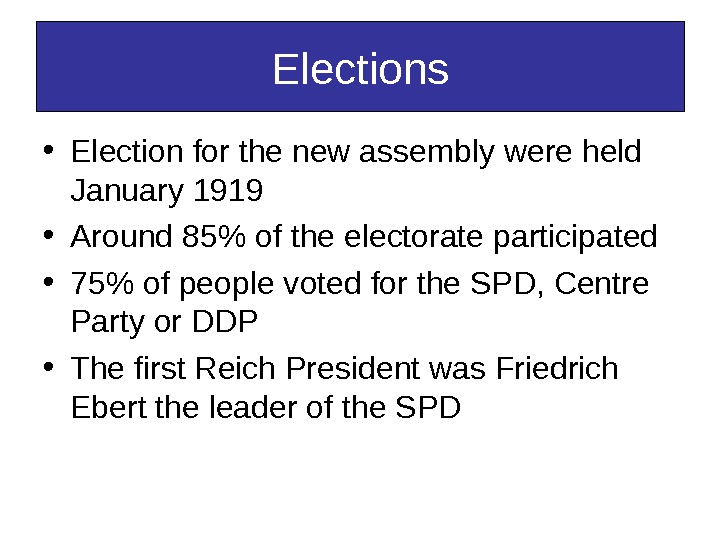


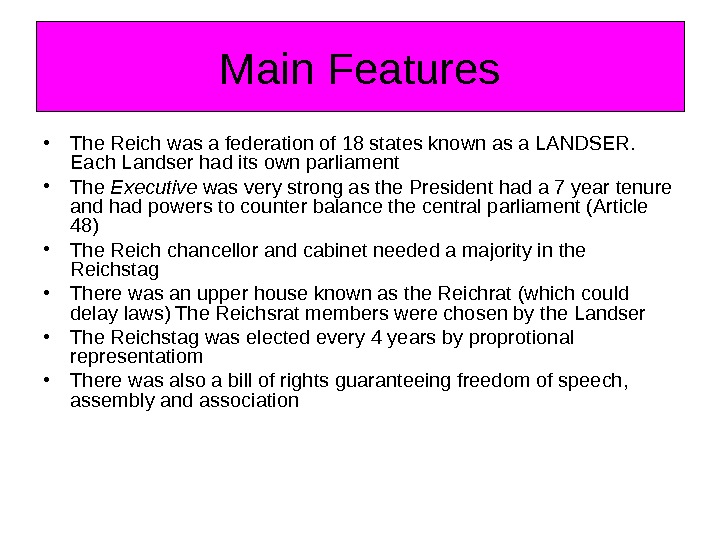



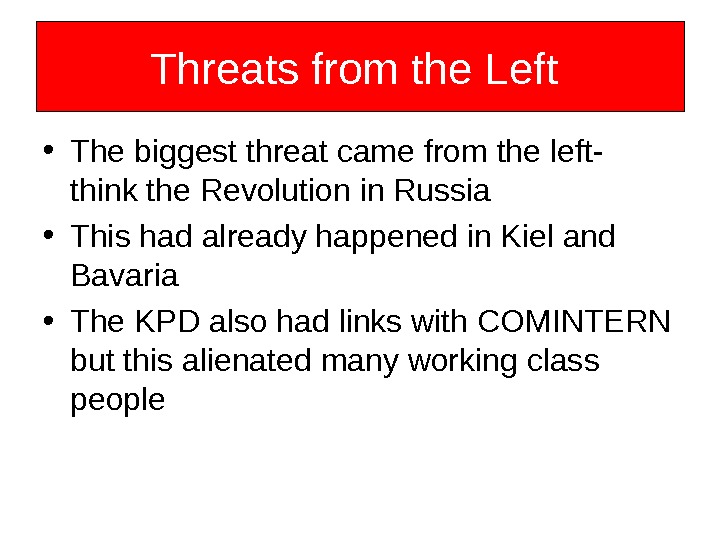
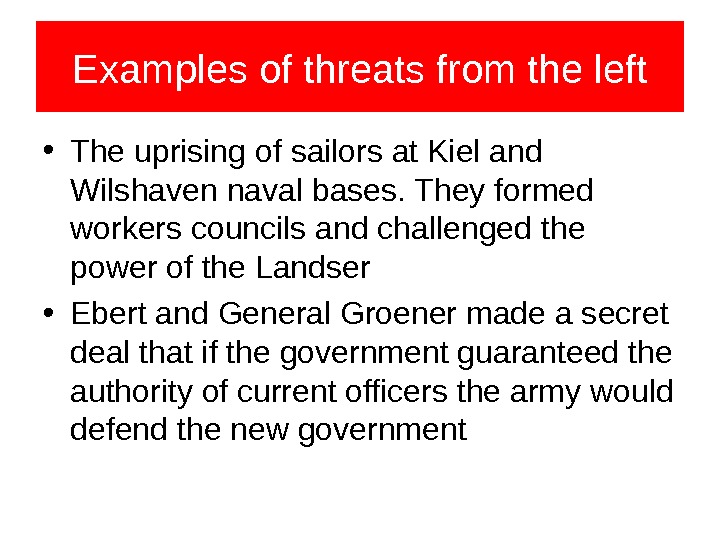
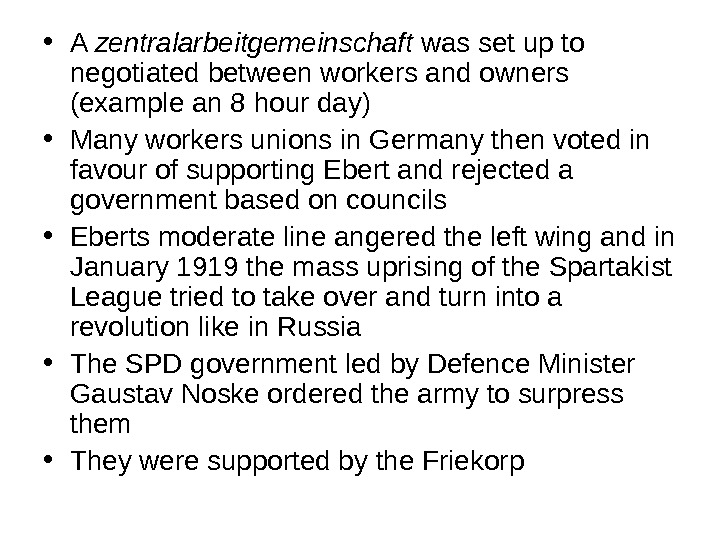



- Размер: 51.5 Кб
- Количество слайдов: 16
Описание презентации Презентация Weimar Constitution по слайдам
 The Weimar Constitution and political parties Threats from the Left Threats from the Right
The Weimar Constitution and political parties Threats from the Left Threats from the Right
 Connector Left Right
Connector Left Right
 Outcomes • All students to know the constitution of the Weimar Republic • Most to know the threats of from the left and right • Some to be able to see how this would affect Germany’s political future
Outcomes • All students to know the constitution of the Weimar Republic • Most to know the threats of from the left and right • Some to be able to see how this would affect Germany’s political future
 Elections • Election for the new assembly were held January 1919 • Around 85% of the electorate participated • 75% of people voted for the SPD, Centre Party or DDP • The first Reich President was Friedrich Ebert the leader of the SP
Elections • Election for the new assembly were held January 1919 • Around 85% of the electorate participated • 75% of people voted for the SPD, Centre Party or DDP • The first Reich President was Friedrich Ebert the leader of the SP
 Situation • Hugo Preuss was appointed Secretary of State in the Ministry of the Interior with the responsibility of drawing up a constitution • They had problems – No Kaiser – Defeat of war – The revolution – There was no party with a majority
Situation • Hugo Preuss was appointed Secretary of State in the Ministry of the Interior with the responsibility of drawing up a constitution • They had problems – No Kaiser – Defeat of war – The revolution – There was no party with a majority
 A constitution • What was the role of the Reichstag to be? • How much power should the President have? • What was the relationship between the state and the government to be? • What was the constitution going to involve?
A constitution • What was the role of the Reichstag to be? • How much power should the President have? • What was the relationship between the state and the government to be? • What was the constitution going to involve?
 Main Features • The Reich was a federation of 18 states known as a LANDSER. Each Landser had its own parliament • The Executive was very strong as the President had a 7 year tenure and had powers to counter balance the central parliament (Article 48) • The Reich chancellor and cabinet needed a majority in the Reichstag • There was an upper house known as the Reichrat (which could delay laws) The Reichsrat members were chosen by the Landser • The Reichstag was elected every 4 years by proprotional representatiom • There was also a bill of rights guaranteeing freedom of speech, assembly and association
Main Features • The Reich was a federation of 18 states known as a LANDSER. Each Landser had its own parliament • The Executive was very strong as the President had a 7 year tenure and had powers to counter balance the central parliament (Article 48) • The Reich chancellor and cabinet needed a majority in the Reichstag • There was an upper house known as the Reichrat (which could delay laws) The Reichsrat members were chosen by the Landser • The Reichstag was elected every 4 years by proprotional representatiom • There was also a bill of rights guaranteeing freedom of speech, assembly and association
 Billof. Rights promisesall. Germansequalitybeforethelawandpoliticaland religiousfreedom. Electors Allmenandwomenovertheageof 20 canvote. safeguards elect Freidrich. Ebert (electedpresident) Hehadspecialpowersunder. Article 48 Heiselectedbythetheelectorate Reichstag (elected) Lawandmakingbodyelectedevery 4 yearsbyproportional representaion controls from which is selected The. Army Government Chancellor(presidedoverthegovernmentbuthadtoresignifthe Reichstaglostconfidenceinthem) Ministers musthaveamajorityinthe. Reichstagandmustdoasthe. Reichstag says.
Billof. Rights promisesall. Germansequalitybeforethelawandpoliticaland religiousfreedom. Electors Allmenandwomenovertheageof 20 canvote. safeguards elect Freidrich. Ebert (electedpresident) Hehadspecialpowersunder. Article 48 Heiselectedbythetheelectorate Reichstag (elected) Lawandmakingbodyelectedevery 4 yearsbyproportional representaion controls from which is selected The. Army Government Chancellor(presidedoverthegovernmentbuthadtoresignifthe Reichstaglostconfidenceinthem) Ministers musthaveamajorityinthe. Reichstagandmustdoasthe. Reichstag says.
 Good or bad • You need to know the arguments for and against the Weimar Republic Good Bad Democracy Majority government is hard to achieve
Good or bad • You need to know the arguments for and against the Weimar Republic Good Bad Democracy Majority government is hard to achieve
 Activity • Fill in the grid comparing the Weimar system, the Second Reich and the UK
Activity • Fill in the grid comparing the Weimar system, the Second Reich and the UK
 Threats from the Left • The biggest threat came from the left- think the Revolution in Russia • This had already happened in Kiel and Bavaria • The KPD also had links with COMINTERN but this alienated many working class people
Threats from the Left • The biggest threat came from the left- think the Revolution in Russia • This had already happened in Kiel and Bavaria • The KPD also had links with COMINTERN but this alienated many working class people
 Examples of threats from the left • The uprising of sailors at Kiel and Wilshaven naval bases. They formed workers councils and challenged the power of the Landser • Ebert and General Groener made a secret deal that if the government guaranteed the authority of current officers the army would defend the new government
Examples of threats from the left • The uprising of sailors at Kiel and Wilshaven naval bases. They formed workers councils and challenged the power of the Landser • Ebert and General Groener made a secret deal that if the government guaranteed the authority of current officers the army would defend the new government
 • A zentralarbeitgemeinschaft was set up to negotiated between workers and owners (example an 8 hour day) • Many workers unions in Germany then voted in favour of supporting Ebert and rejected a government based on councils • Eberts moderate line angered the left wing and in January 1919 the mass uprising of the Spartakist League tried to take over and turn into a revolution like in Russia • The SPD government led by Defence Minister Gaustav Noske ordered the army to surpress them • They were supported by the Friekorp
• A zentralarbeitgemeinschaft was set up to negotiated between workers and owners (example an 8 hour day) • Many workers unions in Germany then voted in favour of supporting Ebert and rejected a government based on councils • Eberts moderate line angered the left wing and in January 1919 the mass uprising of the Spartakist League tried to take over and turn into a revolution like in Russia • The SPD government led by Defence Minister Gaustav Noske ordered the army to surpress them • They were supported by the Friekorp
 Other threats from the left • Ruhr 1920 Communist • Central Germany March 1921 Communist • Hamburg October 1923 Communist
Other threats from the left • Ruhr 1920 Communist • Central Germany March 1921 Communist • Hamburg October 1923 Communist
 Threats from the Right • 1920 March-Right Wing Kapp Putsch • 1923 November- Munich Putsch led by Hitler
Threats from the Right • 1920 March-Right Wing Kapp Putsch • 1923 November- Munich Putsch led by Hitler
 Kapp Putsch • Industrialists, landowners, miliary families, Freikorp, Volkisch groups • In 1920 two Freikorp brigades were asked to disband (12 000 men)of which two leaders, General von Luttwitz and Wolfgang Kapp, leader of the Father land party refused • On 12 March 12000 Freikorp marched to Berlin where the army refused to support the government, who then fled. Kapp proclaimed a new government but it failed to gain any support even from Conservatives • The Left organised a strike and Berlin was paralysed and even the banks refused to recognise the government • After 4 days they fled and Ebert returned to Berlin, whilst there were fights between workers and the army • No action was taken against the army as Ebert recognised he may need them for the fight against the Communists.
Kapp Putsch • Industrialists, landowners, miliary families, Freikorp, Volkisch groups • In 1920 two Freikorp brigades were asked to disband (12 000 men)of which two leaders, General von Luttwitz and Wolfgang Kapp, leader of the Father land party refused • On 12 March 12000 Freikorp marched to Berlin where the army refused to support the government, who then fled. Kapp proclaimed a new government but it failed to gain any support even from Conservatives • The Left organised a strike and Berlin was paralysed and even the banks refused to recognise the government • After 4 days they fled and Ebert returned to Berlin, whilst there were fights between workers and the army • No action was taken against the army as Ebert recognised he may need them for the fight against the Communists.

